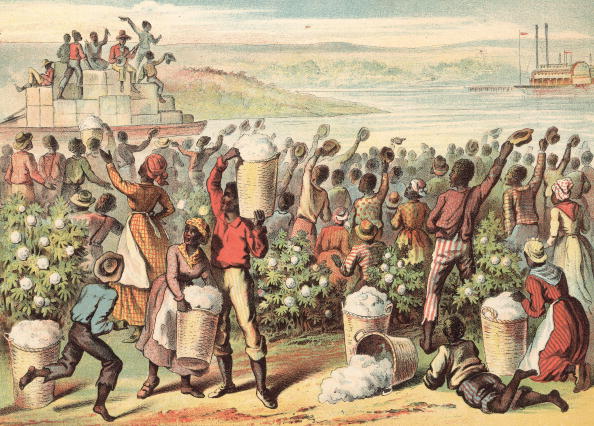
Kean Collection/Getty Images
High School Students And Educators Woefully Uninformed About Slavery
This should come as no surprise as many times as we’ve posted about some of the stupid lessons on slavery kids are receiving in the US, but a new reportreleased by the Southern Poverty Law Center’s Teaching Tolerance project reveals the widespread failure to accurately teach the history of American slavery and enslaved people.
According to Atlantic reports Teaching Tolerance conducted online surveys of 1,000 American high-school seniors and more than 1,700 social-studies teachers across the country. The group also reviewed 10 commonly used U.S.-history textbooks, and examined 15 sets of state standards to assess what students know, what educators teach, what publishers include, and what standards require vis-à-vis slavery.
What they found was that only 8 percent of 12th-graders could identify slavery as the cause of the Civil War. Fewer than one-third (32 percent) correctly named the 13th Amendment as the formal end of U.S. slavery, with a slightly higher share (35 percent) choosing the Emancipation Proclamation. And fewer than half (46 percent) identified the “Middle Passage” as the transport of enslaved Africans across the Atlantic Ocean to North America.
Fewer than one-quarter (22 percent) of participating high-school seniors knew that “protections for slavery were embedded in [America’s] founding documents”—that rather than a “peculiar institution” of the South, slavery was a Constitutionally enshrined right. And fewer than four in 10 students surveyed (39 percent) understood how slavery “shaped the fundamental beliefs of Americans about race and whiteness.”
The teachers didn’t do much better than the students.
While teachers overwhelmingly (92 percent) claim they are “comfortable discussing slavery” in their classroom, only slightly more than half (52 percent) teach their students about slavery’s legal roots in the nation’s founding documents, while just 53 percent emphasize the extent of slavery outside of the antebellum South. And 54 percent teach the continuing legacy of slavery in today’s society.
Additionally, dozens of teachers rely on “simulations”—role-playing and games—to teach slavery, a method that Teaching Tolerance has warned against on the grounds that it can lead to stereotypes and oversimplification. Meanwhile, a large majority—73 percent—use “slaves” when talking about slavery in the classroom instead of “enslaved persons” (49 percent), the latter term of which has gained favor for emphasizing the humanity of those forced into bondage.
That’s a strong point about slaves vs. enslaved persons. Did you ever consider the impact of the wording? Also those games and simulations are how so many teachers are getting in trouble. Teachers — stop playing GAMES. Just keep it 100 with the kids and make sure they know HUMANS were treated INHUMANELY!
LaGarrett King, an assistant professor of social-studies education at the University of Missouri, served on the Teaching Tolerance advisory board that developed a framework for teaching American slavery—basically, the concepts that every graduating high-school senior should know—as part of the report’s recommendations. As a teacher educator, he said the study fills a significant void.
Students training to be teachers, especially those being educated to teach in elementary schools, know little about the history of slavery, he stated, noting that “much curriculum and teaching around racially and ethnically diverse [people] features a fun—foods and festival—approach to learning.” By contrast, King said, the framework provides a guide to delve into topics such as slavery and black history with a thorough and academically sound approach, versus teaching slavery in reductive and superficial ways.
“Can you teach slavery without it being psychologically violent to the children? The answer is no, violence will occur and is expected,” he said. “The key is the recognition of white supremacy and [of] the humanity of black people that helps aid in the complexity of the subject.”
What steps do you think need to be taken to make sure that the harsh realities of slavery and the impact of the institution on America overall are taught?








Comments
Bossip Comment Policy
Please read our Comment Policy before commenting.